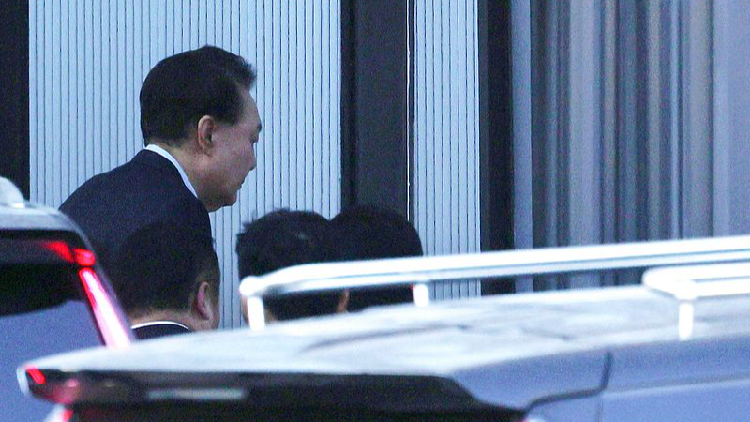
<img src='https://news.cgtn.com/news/2025-01-15/What-s-next-for-South-Korea-after-impeached-president-s-arrest-1Abwg4N4WwE/img/82d0efc2653b4fa780c9c23a0be99b62/82d0efc2653b4fa780c9c23a0be99b62.jpeg' alt='South Korea's impeached president Yoon Suk-yeol arrives at the complex building housing the Corruption Investigation Office for High-ranking Officials in Gwacheon, south of Seoul, January 15, 2025. /CFP'
South Korean investigators announced on Wednesday the arrest of impeached president Yoon Suk-yeol during their second attempt to execute the arrest warrant.
The joint investigation unit, composed of the Corruption Investigation Office for High-ranking Officials (CIO), the National Office of Investigation, and the Defense Ministry’s investigative headquarters, confirmed that Yoon was taken into custody at 10:33 a.m. local time (0133 GMT) Wednesday.
The arrest, marking the first in the country’s history for a sitting president, took hours as the investigators gathered at the presidential residence before 5 a.m. local time and had a short confrontation with the presidential security service.
In a brief statement, Yoon said he had decided to appear for CIO questioning to avoid bloodshed despite the “illegal” investigation.
TV footage showed that a black vehicle carrying the arrested president arrived at the CIO office in Gwacheon, where questioning commenced at 11 a.m. local time. Following the investigation, Yoon will be transferred to the Seoul Detention Center for custody, with plans to record and videotape the entire process.
The CIO will be required to decide within 48 hours whether to seek a separate warrant to extend Yoon’s detention for up to 20 days for further questioning or release him.
According to media reports, the CIO has prepared over 200 pages of investigative questions, an increase in number compared to the first execution of the arrest warrant.
The investigation topics include the circumstances surrounding the declaration of emergency martial law, whether Yoon ordered the arrest of key political figures, attempts to paralyze the functions of the National Assembly, efforts to control the National Election Commission, and whether plans were made for a second emergency martial law, among others.
According to local media outlet News1, although the CIO plans to conduct an intensive investigation, Yoon may invoke his right to remain silent, which could pose challenges to the investigation process.
Some analysts, however, believe that as a former prosecutor general, Yoon might leverage his legal knowledge and investigative experience to deny the allegations against him. There is also the possibility that he may selectively answer certain questions during the investigation.
Kwon Ki-sik, a former presidential secretary for state affairs monitoring, said the arrest could be seen as a victory for the South Korean people, noting widespread public support for Yoon’s impeachment.
Since Yoon has been accused of being the “ringleader of insurrection,” the CIO will likely apply for and secure approval for a detention warrant, extending his custody up to 20 days after the initial 48-hour investigation period. At that point, Yoon will be transferred to the Seoul Detention Center for custody.
Da Zhigang, director of the Institute of Northeast Asian Studies at China’s Heilongjiang Academy of Social Sciences, said Yoon’s decision to step forward came after multiple considerations.
His proactive appearance could lead to more positive evaluations from public opinion and the international community, said Da, adding that this could also prompt the constitutional court’s justices to be more cautious, aligning with Yoon’s statement earlier that he would “face impeachment or investigations with dignity.”
Furthermore, Yoon’s legal team has used “delay tactics” to strengthen its case by organizing the team and gathering evidence for the trial, giving the president more confidence to make the decision. If he continues to delay sufficient legal or rational justification, it could work against him, Da said.
However, South Korea’s constitutional court on Tuesday rejected Yoon’s request to exclude a newly appointed justice recommended by the opposition party, in the first formal hearing of his impeachment trial. Da said that this request was unanimously rejected by the other seven justices. The “unanimous” decision somewhat reflects the attitude of the court.
Given the gravity of the allegations, Yoon is expected to face prosecution during his detention, with the possibility of a heavy sentence. Additionally, this development is likely to expedite the constitutional court’s review of Yoon’s impeachment case, with a verdict potentially being reached by mid-March or later, according to Kwon.